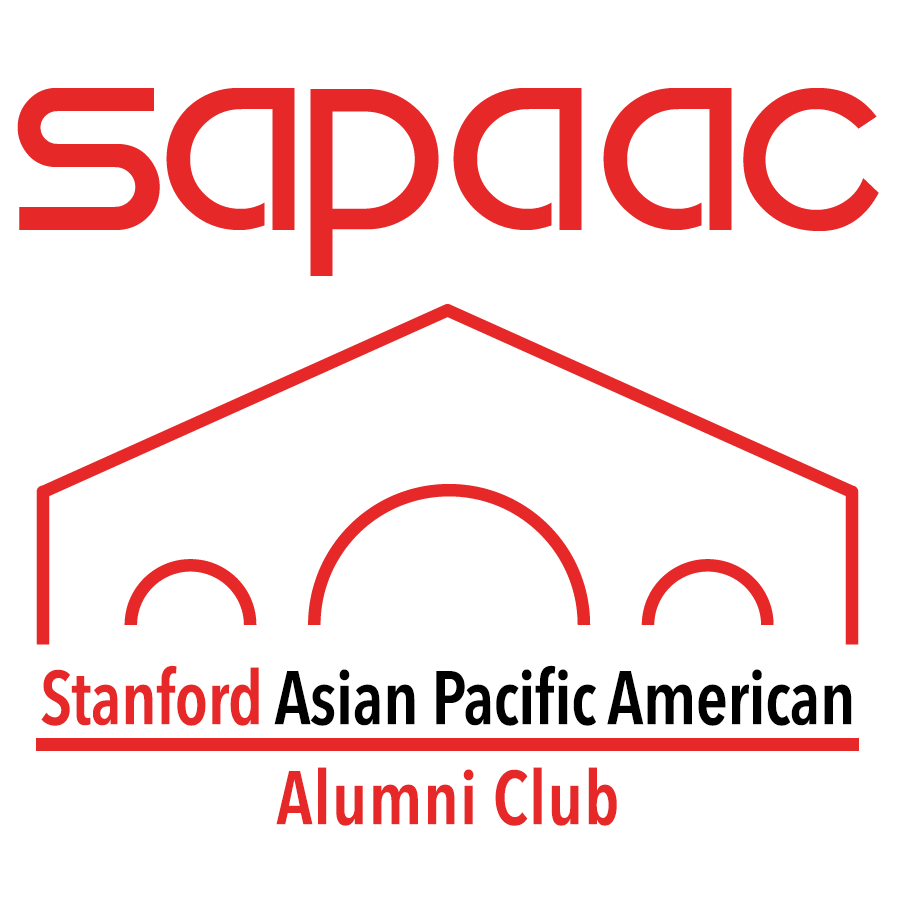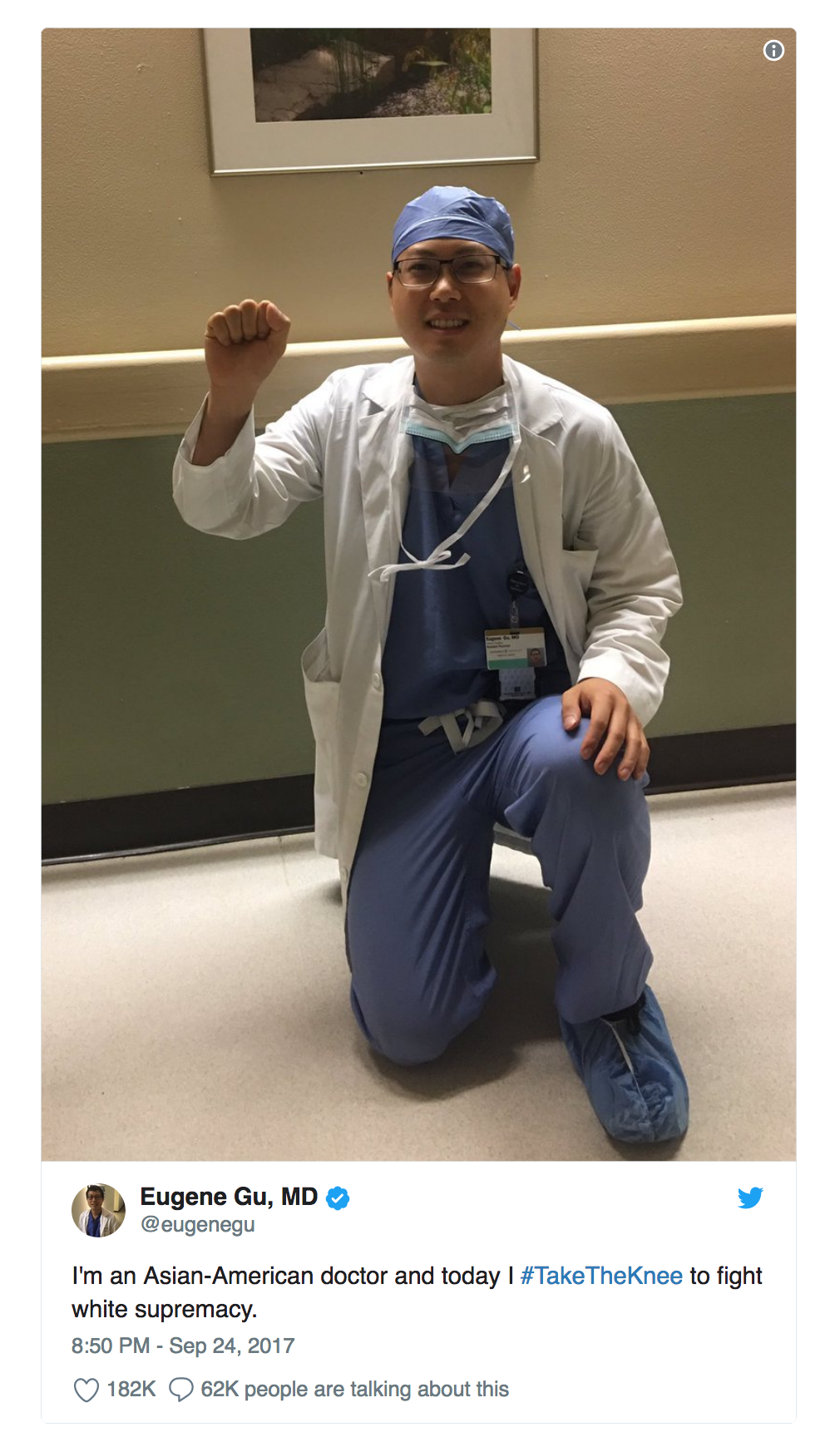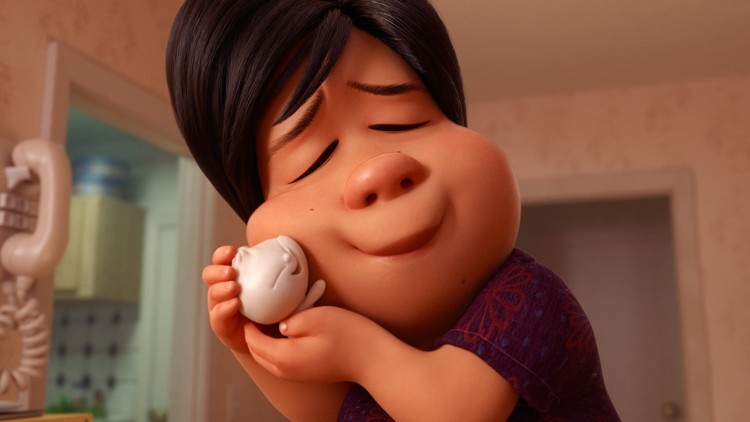Asian Americans in Politics
June was the month of primary contests, and this year, numerous political reports focused on Asian Americans, especially on the West Coast. The Washington Post asks, “Will Asian Americans make California even bluer in November?” The New York Times reports that “Democrats Hope an Asian Influx Will Help Turn Orange County Blue.” The article quotes Columbia University sociology professor Jennifer Lee sharing her surveys of AAPI political attitudes:
Dr. Eugene Gu
Source: Next Shark
“‘Because of Republican rhetoric against immigration, Republicans are really turning off Asian-Americans,’ said [Lee.] She said both parties needed to work harder for Asian votes. ‘As they grow as a larger voting bloc, they’re really up for grabs,’ she said. But younger Asian-Americans, especially those born in the United States, have tended to swerve left of their elders.”
The Wall Street Journal notes that Asians now make up 18% of Orange County’s population, up from 4%, which means “Republicans, Democrats see Asian-Americans as key to victory in Southern California“ according to CNN. National Public Radio highlights these "Asian-American Voters Of Orange County” in more depth. Several Asian American political candidates won their primary contests and will stand for election in November.
Dr. Eugene Gu, a young AAPI surgeon who called out racism and stood up for minority rights, has been fired from Vanderbilt University Medical Center. He is also known for being one of seven Twitter users who recently won a federal case against President Trump. The court ruled Trump had violated citizens’ First Amendment rights by “blocking them from commenting on his tweets.”
Supervisor Jane Kim '99
Source: San Francisco Board of Supervisors
Jane Kim '99, placed third in a close-fought San Francisco mayoral race, but she pushed the city in a much more progressive direction during the campaign, calling for new policies to reign in tech companies and promote fairness. Kim and Supervisor Norman Yee advocated for Local Measure C, a new tax to fund child care subsidies, which passed.
Incumbent AAPI members of Congress, including Ami Bera, Ro Khanna, Judy Chu, Ted Lieu, Mark Takano, won their races. California State Treasurer John Chiang placed fifth in the race for governor. Newcomer Republican Young Kim advanced to the general election, as did Fiona Ma for Treasurer and Betty Yee for Controller. David Chiu and Phil Ting will defend seats in the Assembly, while Andrew Y.S. Cheng and Cynthia Ming-mei Lee won seats as judges in San Francisco.
Immigration & Integration
Many Indians and South Asians are being detained in Oregon by the immigration crackdown, while Asian Americans in New York are rallying around a Chinese dad who was taken away during a green card interview. Chinese-American fashion designer Alexander Wang has based his latest collection on his family's immigration story. He moved the show’s timing up to make a statement on a national issue.
The New York Times discusses the impact of the immigration debate and the US-North Korea talks on Korean Americans, who are "feeling a whipsaw of emotions over the administration’s actions in recent days. While the president has infuriated some with his policies and rhetoric on immigration, others are hopeful that his approach to foreign affairs could help bring peace to a long-divided region where the vast majority of Korean-Americans still have relatives.”
Racial slurs targeting Asian Americans (who were actually American citizens) made a stir in the Bay Area, including Half Moon Bay and Fremont, when the victims posted video evidence on social media.
The 1944 Korematsu ruling that justified the internment of Japanese Americans during WWII was finally overturned by the Supreme Court. However, it was not a joyous occasion, as it came in a side comment, within a ruling that upheld the government's proposed travel ban on people from certain Muslim-majority countries. In fact, the dissent penned by Supreme Court Justice Sotomayor inveighed against the new ruling and compared it to Korematsu in its racial animus.
Incoming Stanford Freshman Speaks Out on Sexual Assault
Senior Lulzabel Seitz, whose speech was cut off by high school officials.
Source: YouTube
High school valedictorian Lulabel Seitz was giving her commencement address at Petaluma High School, when she brought up the challenge of sexual assault. School officials cut off her microphone, preventing her from giving the rest of the speech. Seitz, who is Filipina-American, intended to critique an educational environment where students were “learning on a campus in which some people defend perpetrators of sexual assault and silence their victims.” Ironically, she was silenced on graduation day when she tried to speak out on the issue.
In a YouTube video (https://m.youtube.com/watch?v=SWbFmi_lqdo) she later posted, Seitz explains that “the administration unfairly cut off my mic, and even when my classmates stood up to say that I should speak, they still did not let me finish my speech.” NPR interviewed her about the high school’s attempt to silence her message. She will be joining the Stanford University community this fall as a freshman (Class of '22). Go Card!
it will be interesting to see if she brings the same spirit of standing up to official complicity and complacency regarding sexual assault to the Farm, an issue that has deeply concerned students and alumni in recent years.
Lawsuit Against Harvard Alleges Discrimination in Race-Based Admissions
A group of Asian American plaintiffs has filed a lawsuit against Harvard University, claiming that the school stereotyped and discriminated against applicants with Asian backgrounds. According to The New York Times, the suit claims that “Asian-Americans scored higher than applicants of any other racial or ethnic group on admissions measures like test scores, grades and extracurricular activities, according to the analysis commissioned by a group that opposes all race-based admissions criteria.” But the university “ranked Asian-American applicants "lower on personality traits” (such as likability, courage, kindness, being "widely respected" "attractive to be with" or having a "positive personality") which hindered their chances of admissions.
Drawing from documents made public by the same lawsuit, the Washington Post reports that “an internal Harvard University review from five years ago suggested Asian American applicants would be let into the undergraduate college in much greater numbers if academic performance were the only criterion for admission...The review from Harvard’s Office of Institutional Research, uncovered by the plaintiff in a federal lawsuit, appeared to indicate that applicants of Asian descent would constitute 43 percent of the admitted class at the ultra-selective university under a hypothetical “academics-only” model." As explained by NPR, the plaintiffs, Students for Fair Admissions, believe “Harvard uses ‘racial balancing’ as part of its formula for admitting students and that the practice is illegal.”
The Atlantic makes the more subtle point that it may actually be implicit biases and stereotypes skewing these subjective personality ratings, rather than affirmative action and racial considerations outright.
Source: The Stanford Sphere
The controversial suit has split opinions in the Asian American community. Some AAPI support the lawsuit for crying foul over discrimination and demanding a return to meritocratic standards. Others are concerned the lawsuit targets the wrong problem and could harm affirmative action efforts that generally aid minorities in the United States. They are also concerned about ethnic minorities being pitted against each other, while failing to address the overarching problem of systemic racism that benefits the white majority. The New York Times offers a nuanced article that consults voices from across the spectrum and underscores the challenge of confronting discrimination against Asian Americans, while an op-ed in the same paper gives a poignant rejoinder that Asian Americans are not the stereotypes they're often made out to be, even by Harvard admissions officers.
One Stanford student commentator suggests that Asian Americans "are victims of false advertising, not discrimination" because elite universities are simply not meritocratic in the first place. However, by "perpetuating a false image of meritocracy when the reality of college admissions is more complicated"—for example, schools use "holistic" factors to shape their classes, which is legitimate in some circumstances, but historically has also been used to uphold a white majority—the universities create a mismatch between reality and the public's expectations.
Chinese Proverbs - Real or Fake?
Still from Kung Fu Panda movie
Ivanka Trump made up a quote to support her father’s political actions, and then brazenly labeled it a “Chinese proverb.” Numerous experts promptly pointed out that her quote was not a Chinese proverb. The incident illustrates the ease with which Americans can tokenize Asians, playing off the stereotype that they are mysterious, wise, and inscrutable. Even if some of those traits are positive, it results in an “othering” of Asians and Asian Americans.
Conversely, using an actual Chinese proverb, The Global Times, a Chinese government propaganda outlet, suggested that only “fools build walls” in reference to Trump’s tariff scheme.
Asian Representation in Popular Media
Source: Pixar
The latest Pixar short film stars Bao, an anthropomorphic Chinese soup dumpling, premiering before Incredibles II. Bao’s creator, Domee Shi, is a Chinese Canadian, and the first woman to direct a Pixar short “in the company’s 32-year history.”
In an interview with NPR, Shi explains how her own Chinese mother inspired the work and shares her mom’s recipe for dumplings online. The Los Angeles Times asks Shi about “overcoming her doubts to craft a specifically Chinese story.”
Jeremy Lin, a Taiwanese-American NBA basketball player who shot to fame with Linsanity, spoke at a graduation ceremony for National Chengchi University in Taiwan.
Chrysanthe Tan ’09 was featured in “10 Contemporary LGBTQ Composers You Should Know for Pride Month” by Arts Boston. SAPAAC included some of her songs on our playlist for the first-ever Stanford Asian Pacific American Alumni Summit last year. Her recent release is "Bundle of Joy," a cover from the film Inside Out.
The Guardian reports on the influence of K-pop in America: Between 2013 and 2016, as K-pop grew dramatically in popularity in America, US college enrollments in Korean classes went up 65%, even as overall enrollments in foreign language courses dropped off.”
June is Pride Month, and NBC features LGBTQ Asian Americans in a 5-part video series on “Searching for Queer Asian Pacific America."
—Find more at SAPAAC Issues & Advocacy http://www.sapaac.org/issuesandadvocacy








